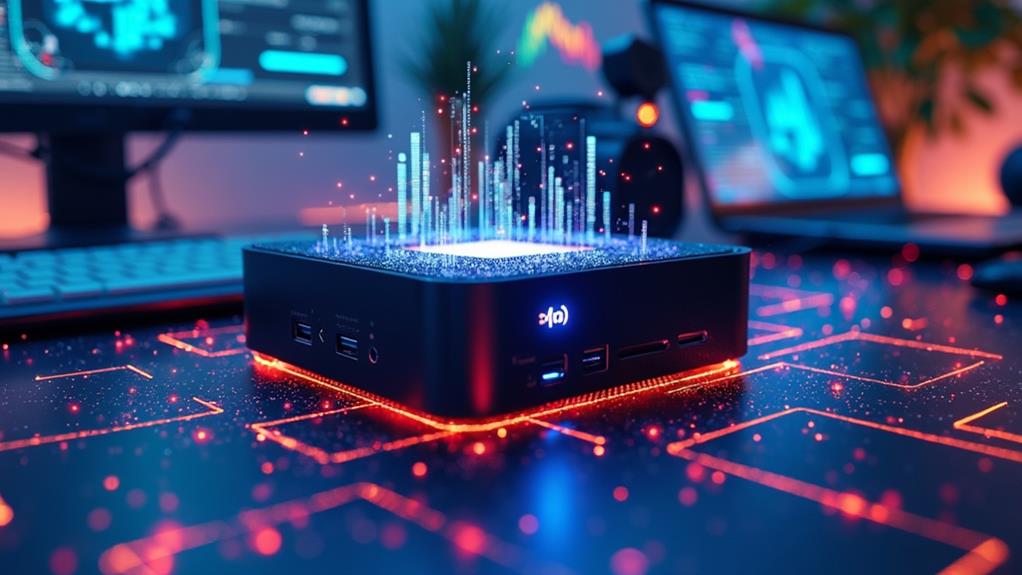



Let’s settle the mystery, shall we? This quick read aims to untangle the enigma surrounding mini PCs and their compatibility with CD/DVD drives. Whether you’re a technology enthusiast or just someone looking for a compact computing solution, we’ll explore the ins and outs of mini PCs in relation to these trusted storage media options. Get ready to discover the answer to the burning question: do mini PCs have CD/DVD drives?
Understanding the Mini PC
Definition of a Mini PC
A Mini PC, also known as a Small Form Factor PC, is a compact computer that typically measures less than 10 inches in width and depth. These small devices are designed to provide all the functionality of a traditional desktop computer in a much smaller and more portable package. Mini PCs are often used for tasks such as web browsing, office work, media streaming, and light gaming.
Key features of a Mini PC
One of the key features of a Mini PC is its small size and compact design. This allows for easy transportation and makes it a popular choice for those who are frequently on the go or have limited desk space. Despite their small size, Mini PCs still offer powerful processing capabilities, ample storage options, and typically come with a variety of ports and connectivity options, including USB ports, HDMI ports, and Wi-Fi capabilities.
Different types of Mini PCs
There are several different types of Mini PCs available on the market. Some Mini PCs are barebones kits, which means they come without an operating system, storage, or memory. These kits allow users to customize their Mini PC according to their specific needs and preferences. Other Mini PCs come pre-built and ready to use out of the box. These pre-built options are often more user-friendly for those who may not have the technical knowledge or desire to build their own Mini PC. Additionally, there are Mini PCs specifically designed for gaming, media streaming, or industrial use, each with their own unique features and specifications.
The Evolution of Computer Storage
History of storage devices
Computer storage devices have come a long way since the early days of computing. In the early years, computers relied on punch cards and magnetic tape for storage. These technologies had limited capacity and were quite cumbersome to use. Over time, storage devices such as floppy disks, hard disk drives (HDD), and compact discs (CDs) were introduced, providing increased storage capacity and faster access times.
Transition from big to small storage devices
As technology advanced, storage devices evolved to become smaller and more efficient. Floppy disks gave way to smaller, more portable storage options such as USB flash drives and memory cards. Hard disk drives also underwent a transformation, with smaller form factors like 2.5-inch and M.2 becoming common in laptops and Mini PCs. These smaller storage devices allowed for even greater portability and ease of use.
Modern storage solutions
Today, the most popular storage devices include solid-state drives (SSDs), which provide faster data access and increased durability compared to traditional HDDs. SSDs are available in various form factors, including M.2 drives, which are commonly used in Mini PCs due to their compact size. Additionally, cloud-based storage solutions have gained popularity, allowing users to store and access their data remotely via the internet. This eliminates the need for physical storage devices altogether.
Why Mini PCs don’t Generally Include CD/DVD Drives
Size constraints
One of the main reasons Mini PCs don’t generally include CD/DVD drives is due to their compact size. CD/DVD drives require a certain amount of physical space within the Mini PC’s chassis, which can be quite limited. Manufacturers prioritize maximizing the available space to accommodate other essential components, such as the motherboard, processor, and storage devices.
Shift towards digital media
With the rise of digital media and online streaming services, the need for physical CDs and DVDs has diminished significantly. Many users now rely on digital downloads and streaming platforms for their entertainment needs. This shift in consumer behavior has led to a decrease in demand for CD/DVD drives, making them less essential for Mini PC manufacturers to include.
Increase in cloud-based storage
As mentioned earlier, cloud-based storage solutions have become increasingly popular. These services allow users to store their files, including music, movies, and software, in the cloud, accessible from any internet-connected device. With access to cloud storage, there is less reliance on physical media, further reducing the need for CD/DVD drives in Mini PCs.
Pros and Cons of Excluding CD/DVD Drives
Portability and Compactness
The exclusion of CD/DVD drives contributes to the overall portability and compactness of Mini PCs. Without the added bulk and weight of a CD/DVD drive, Mini PCs can easily be transported and take up less space on a desk or table. This makes them a convenient option for individuals who frequently travel or have limited workspace.
Compatibility issues
While the absence of CD/DVD drives offers benefits in terms of size and weight, it can present compatibility issues. Some users may still have a need for physical media, whether it be for installing software, playing older games, or accessing specific files stored on CDs or DVDs. Without a built-in drive, users may need to seek alternative methods to access and use their physical discs.
Need for additional hardware
Without a built-in CD/DVD drive, users who require access to physical media will need to invest in additional hardware. This can include purchasing an external CD/DVD drive, which connects to the Mini PC via USB, or utilizing network-attached storage (NAS) to access media stored on other devices in the network. These additional hardware solutions may incur extra costs and require additional setup and configuration.
Alternative Ways to Use CDs/DVDs with Mini PCs
External CD/DVD drives
One of the most common ways to use CDs and DVDs with Mini PCs is by connecting an external CD/DVD drive. These drives connect to the Mini PC via USB and function in a similar way to built-in drives. External drives come in various sizes and styles, ranging from slim and portable options to larger, more robust models. They offer a convenient solution for accessing and using physical media on Mini PCs.
Using network attached storage
Another alternative for using CDs and DVDs with Mini PCs is by utilizing network-attached storage (NAS). NAS allows users to store their media on a separate device, which can then be accessed by multiple devices within the same network. By connecting a CD/DVD drive to the NAS, users can access and use their physical media through their Mini PC, provided they have a network connection.
Sharing CD/DVD drive over network
Some Mini PC models offer the option to share a CD/DVD drive connected to another device over the network. This allows users to access and use physical media through their Mini PC without the need for additional hardware. However, this feature is not available on all Mini PCs and may require specific software or configuration to work properly.
Notable Mini PCs With Built-In CD/DVD Drives
Specific models that include drives
While Mini PCs without built-in CD/DVD drives are more common, there are still a few notable models available on the market that do include this feature. Some well-known Mini PC models with built-in CD/DVD drives include the Zotac ZBOX Q Series, Dell OptiPlex 7070 Ultra, and Lenovo ThinkCentre M75q-1.
Comparative analysis of these models
When comparing Mini PCs with built-in CD/DVD drives, it is important to consider factors such as performance, storage capacity, and connectivity options. The Zotac ZBOX Q Series, for example, offers powerful hardware specifications and a sleek design. The Dell OptiPlex 7070 Ultra stands out for its modular design, allowing users to choose different configurations to fit their needs. The Lenovo ThinkCentre M75q-1 offers a compact form factor and robust performance for everyday tasks.
Customer experiences and reviews
Customer experiences and reviews can provide valuable insight into the performance and reliability of Mini PCs with built-in CD/DVD drives. It is important to consider feedback from users who have used these specific models to understand the pros and cons of each option. Reading reviews and researching customer experiences can help potential buyers make informed decisions about which Mini PC with a built-in CD/DVD drive best meets their needs.
Notable Mini PCs Without Built-In CD/DVD Drives
Specific models without drives
The majority of Mini PCs available on the market do not include built-in CD/DVD drives. Instead, they focus on providing compact form factors and high-performance specifications. Some notable Mini PCs without built-in CD/DVD drives include the Intel NUC, ASUS VivoMini, and HP EliteDesk Mini.
Comparative analysis of these models
When comparing Mini PCs without built-in CD/DVD drives, factors such as processing power, graphics capabilities, connectivity options, and expansion possibilities should be taken into consideration. The Intel NUC, for example, offers a wide range of options for customization and expansion, allowing users to tailor the device to their specific needs. The ASUS VivoMini stands out for its sleek design and quiet operation, while the HP EliteDesk Mini offers enterprise-level security features and manages to fit a lot of power into a small package.
Customer experiences and reviews
Understanding the experiences and reviews of customers who have used Mini PCs without built-in CD/DVD drives can help potential buyers assess the performance, reliability, and value of these devices. By researching customer feedback and reading reviews, buyers can make informed decisions about which Mini PC without a built-in CD/DVD drive is best suited to their needs and preferences.
Understanding External CD/DVD Drives
How external drives work
External CD/DVD drives are portable devices that connect to a Mini PC via USB. These drives work in a similar way to built-in drives and allow users to read, write, and access CDs and DVDs. They are powered by the Mini PC through the USB connection, eliminating the need for external power sources.
Compatibility with Mini PCs
External CD/DVD drives are compatible with most Mini PCs that have a USB port. These drives are designed to be plug-and-play, meaning they require no additional drivers or software installation. However, it is always recommended to check the specifications of the Mini PC and the external drive to ensure compatibility.
Popular external drive models
There are several popular external CD/DVD drive models available on the market. Some well-regarded options include the LG Electronics 8X USB 2.0 Super Multi Ultra Slim Portable DVD Writer, the ASUS ZenDrive U9M Ultra Slim External DVD Writer, and the Dell DW316 External USB Slim DVD R/W Optical Drive. These drives offer reliable performance, compact designs, and compatibility with various operating systems.
Pros and Cons of Using External Drives
Flexibility of usage
One of the main advantages of using external CD/DVD drives is the flexibility they offer. By connecting an external drive to a Mini PC, users can easily read, write, and access CDs and DVDs whenever needed. External drives can be used with multiple devices, making them a versatile solution for those who require occasional access to physical media.
Additional cost
One potential drawback of using an external CD/DVD drive is the additional cost. Users who need access to physical media will need to purchase an external drive separately, adding to the overall cost of their Mini PC setup. However, external drives are generally affordable and can be considered a worthwhile investment for those who still rely on CDs and DVDs.
Additional equipment to carry
Carrying an external CD/DVD drive adds an extra item to the list of equipment that needs to be transported. While these drives are generally lightweight and portable, they still require additional space in a bag or backpack. For those who prioritize minimalism and prefer to travel light, the need to carry an external drive may be seen as a drawback.
Future of Mini PCs and CD/DVD Drives
Emerging storage technologies
With the advancement of storage technologies, the future of Mini PCs and CD/DVD drives is uncertain. The increasing popularity of cloud-based storage solutions, as well as the trend towards digital media, suggests that the demand for CD/DVD drives will continue to decrease. Newer storage technologies, such as solid-state drives and cloud storage, offer faster access times, higher capacity, and greater convenience. As these technologies become more prevalent, the inclusion of CD/DVD drives in Mini PCs may become even less common.
Market trends in the world of Mini PCs
The market for Mini PCs has been steadily growing in recent years, with increasing demand for compact and portable computing solutions. Manufacturers are continuously improving the performance, efficiency, and design of Mini PCs to meet the needs of different users. Additionally, the introduction of new form factors and connectivity options, such as USB-C and Thunderbolt 3, is shaping the future of Mini PCs and influencing their compatibility with various devices and peripherals.
Predictions about the future of CD/DVD drives in Mini PCs
Based on current trends and the evolving needs of users, it is likely that Mini PCs will continue to move away from including CD/DVD drives. As digital media becomes the norm and cloud-based storage solutions dominate the market, the demand for physical media will continue to decline. However, it is important to note that there will always be niche industries, professionals, and individuals who may still require the use of physical media. As technology advances, alternative methods of accessing and using CDs and DVDs, such as through external drives and network-attached storage, will become more mainstream and convenient options for Mini PC users.
Disclosure: As an Amazon Associate, I earn from qualifying purchases.






